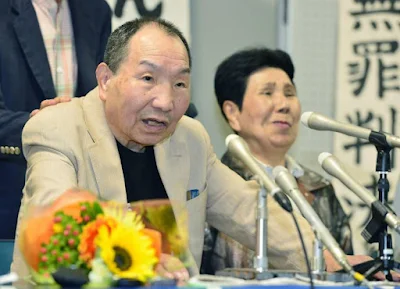Iwao Hakamada, who in a rare example is being retried over a 1966 murder case, will be given a verdict on Sept. 26, the Shizuoka District Court said Wednesday, which could see him finally acquitted more than five decades after he was sentenced to death by the same court.
In the last trial session, prosecutors again sought the death penalty for the 88-year-old, saying there is enough evidence to show that Hakamata is the perpetrator, while defense lawyers argued that he is not guilty.
Hideyo Ogawa, one of Hakamata's defense lawyers, said in a news conference after the trial that he talked about how prison life has changed Iwao Hakamata, who is believed to be suffering from Ganser syndrome, a rare dissociative disorder commonly seen in prisoners, and how he is no longer interested in what's happening around him.
Hideko Hakamata, 91, Iwao Hakamata's older sister, who has been spearheading the campaign to exonerate her brother, was also given an opportunity to speak during the trial.
"I'm relieved" that the trial is over, she said during a news conference, adding that she plans to let her brother know what happened when she gets home. The defendant was not present at the court on Wednesday due to his health conditions.
In the morning session, prosecutors read out a statement from one of the family members of the victims, expressing hope that the truth would be unveiled through the trial.
The Hakamata case has been in the spotlight ever since a retrial was granted. Hakamata had been on death row for over 30 years before being released after his plea for a retrial was granted in 2014.
The focus of the case is on bloodstains on five pieces of clothing, said to have been worn by the perpetrator when the murder was committed, that were found in a miso barrel. Prosecutors have described the bloodstains as dark red, but the defense team has claimed the evidence was planted, since the clothes would have been discolored if they had been in a miso barrel for more than a year.
The case concerns the fatal stabbings of an executive of a miso-maker in Shizuoka Prefecture, his wife and their teenage children at their home on June 30, 1966, before the house was set on fire. Some ¥80,000 in cash was also stolen from the home.
Police arrested Hakamata, who was an employee of the miso-maker, on Aug. 18 of that year, after investigators found traces of gasoline and blood that weren’t his on his pajamas.
Hakamata had denied the charges, but after 20 days of detention and questioning, he admitted to killing the family. Lawyers claim he confessed to the crime due to exhaustion from the interrogation, which lasted for an average of 12 hours each day. Japan’s legal system does not allow lawyers to be present during interrogations.
Despite his initial confession, Hakamata later recanted and pleaded not guilty in the first trial hearing in November 1966, and has since maintained that stance.
A new twist in the case came in August 1967 — more than a year after the murders — when investigators uncovered the five bloodstained clothes in the miso barrel.
Hakamata said that the clothes were not his, but the Shizuoka District Court sentenced him to death in 1968. During a Tokyo High Court trial that took place following an appeal, lawyers questioned why the items of clothing, one of which was too small for Hakamata, were not found earlier, but the court dismissed those complaints, and his death row sentence was finalized in 1980.
When a conviction is finalized, the only way for the person to be exonerated is for a court to grant a retrial — the last resort for those who were wrongfully convicted.
But because a retrial essentially means the district, high and supreme courts handed down rulings based on faulty or insufficient facts, the bar for a retrial is very high.
After his conviction, Hakamata twice sought retrials, with the first request denied by the local, high and supreme courts. But in 2014, the Shizuoka District Court greenlighted his second request — a major breakthrough in the case — allowing him to be released after nearly 50 years in detention and more than 30 years in prison on death row.
The situation was complicated by a subsequent split decision by higher courts. After prosecutors appealed the 2014 decision, the Tokyo High Court denied the retrial request in 2018, while the Supreme Court sent the case back to the high court for further deliberation in 2020.
It was not until March 2023 that the Tokyo High Court granted a retrial, giving Hakamato a glimmer of hope that he could finally be acquitted. The Shizuoka District Court has been deliberating the case since October.
Source: japantimes.co.jp, Staff, May 22, 2024
_____________________________________________________________________
Twitter/X | Facebook | Telegram | Contact Us
"One is absolutely sickened, not by the crimes that the wicked have committed,
but by the punishments that the good have inflicted."
but by the punishments that the good have inflicted."
— Oscar Wilde



